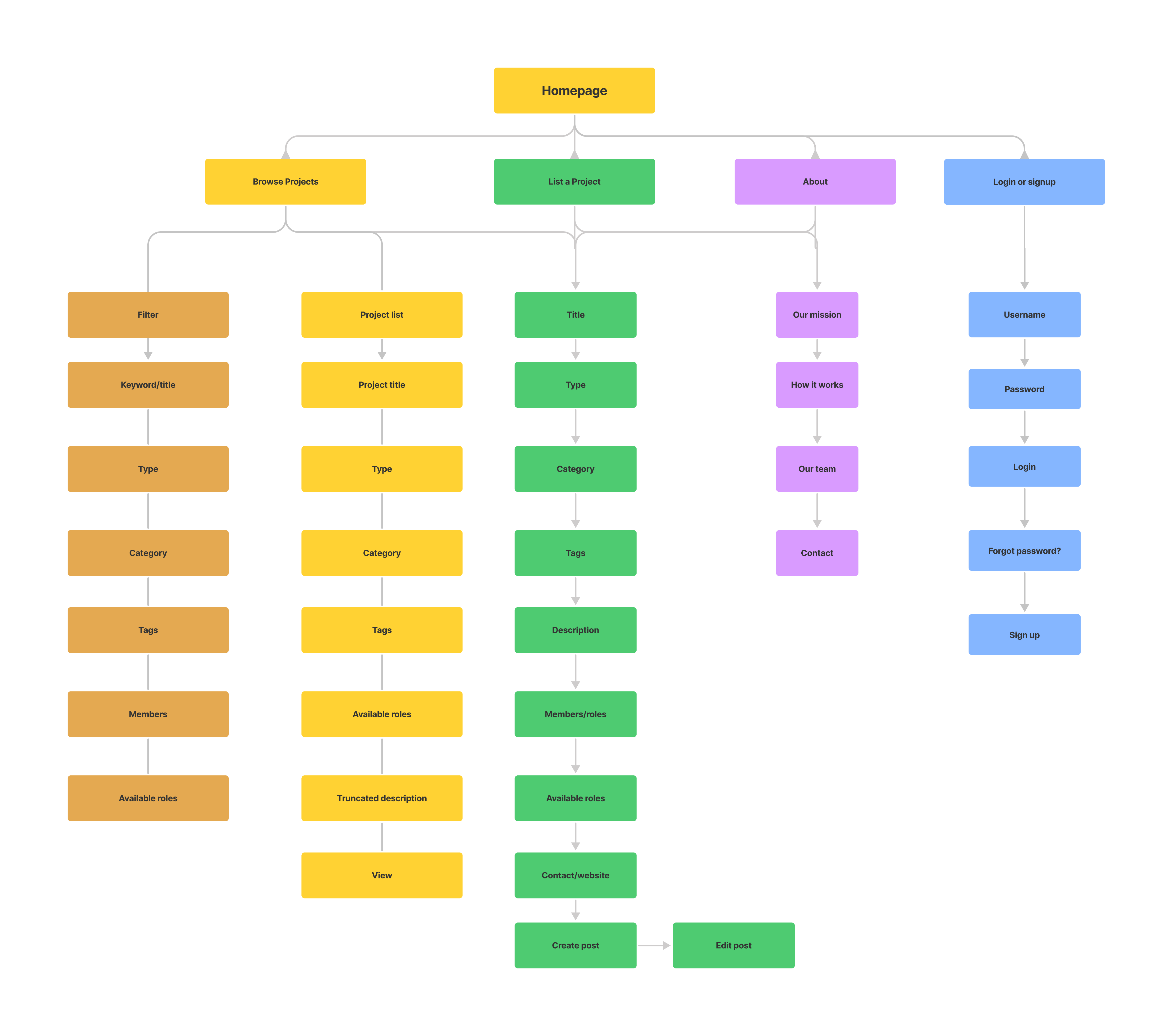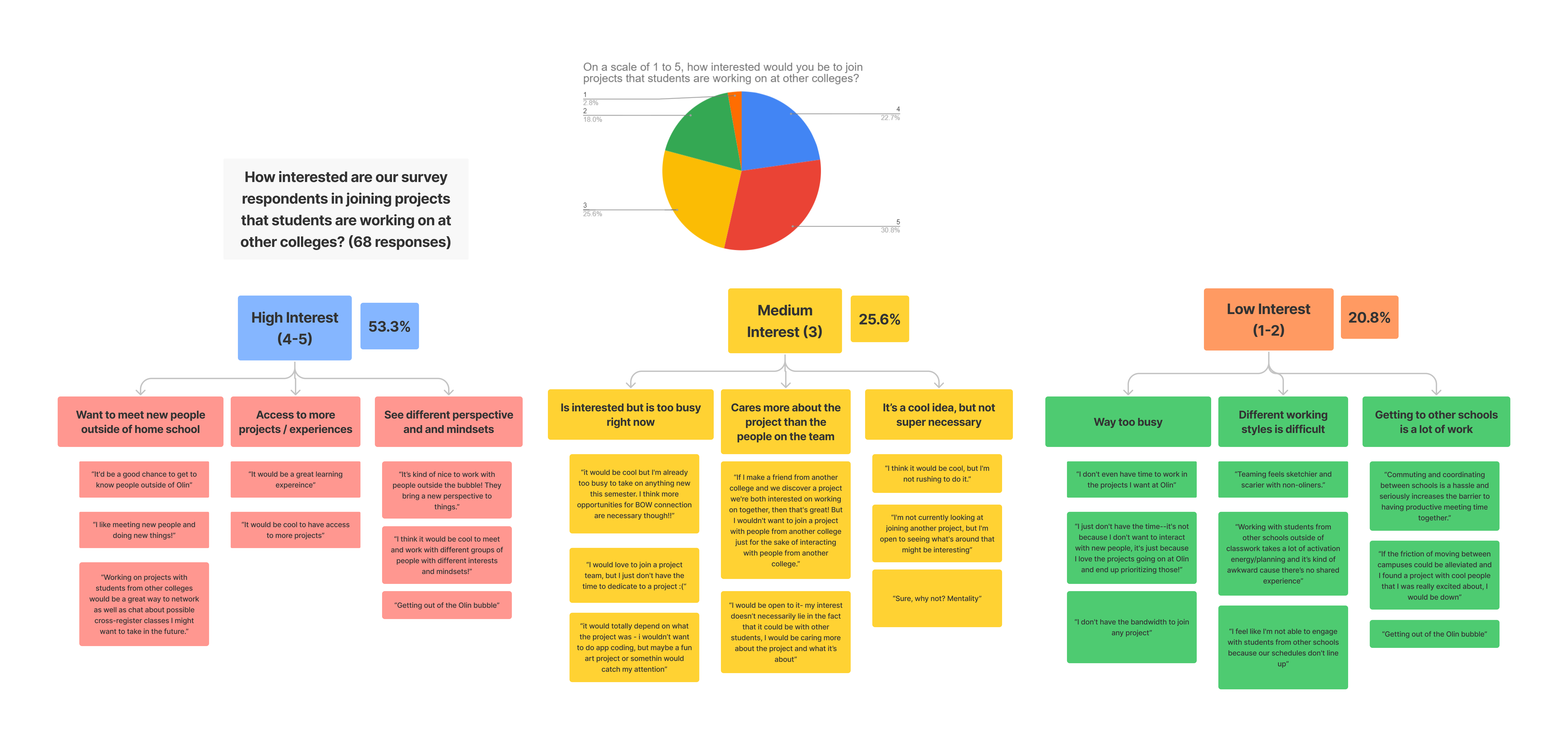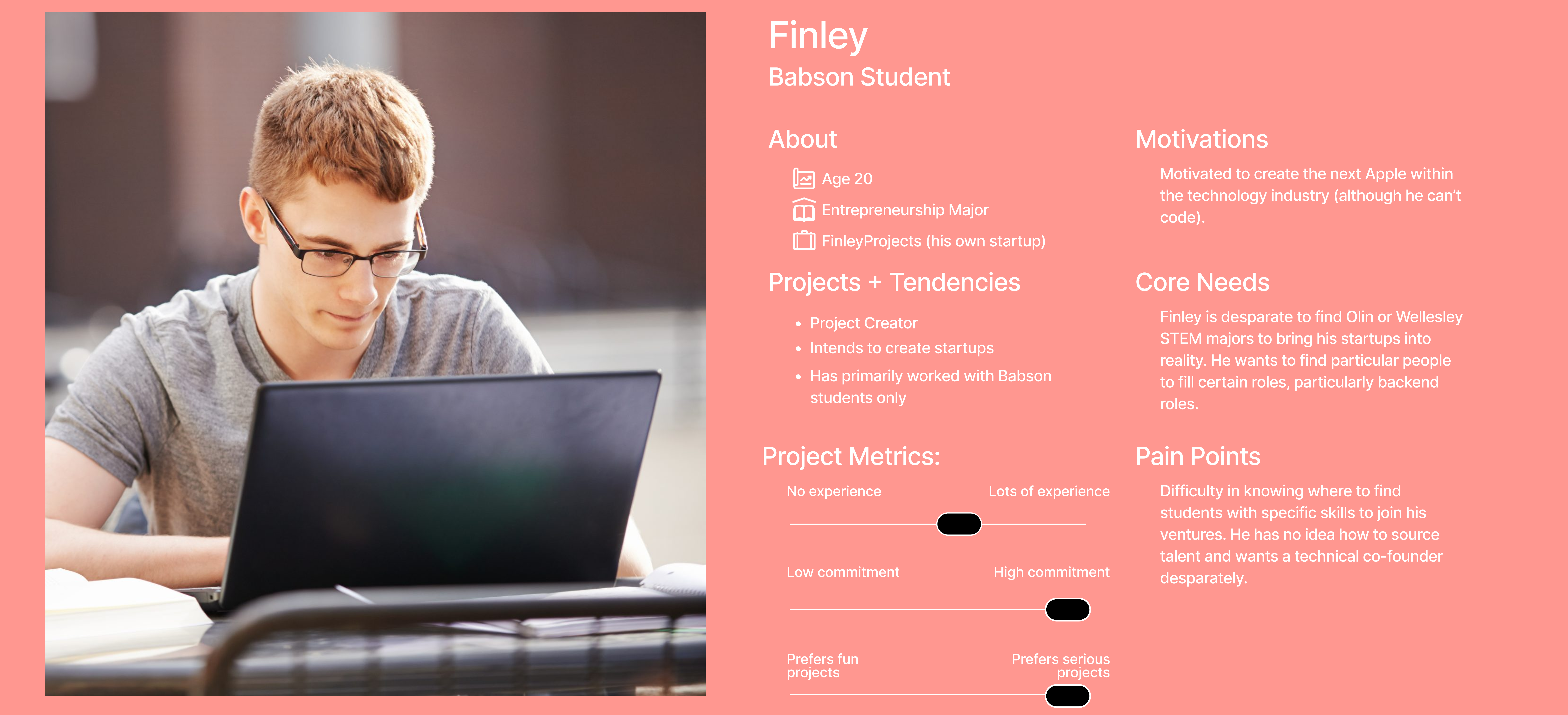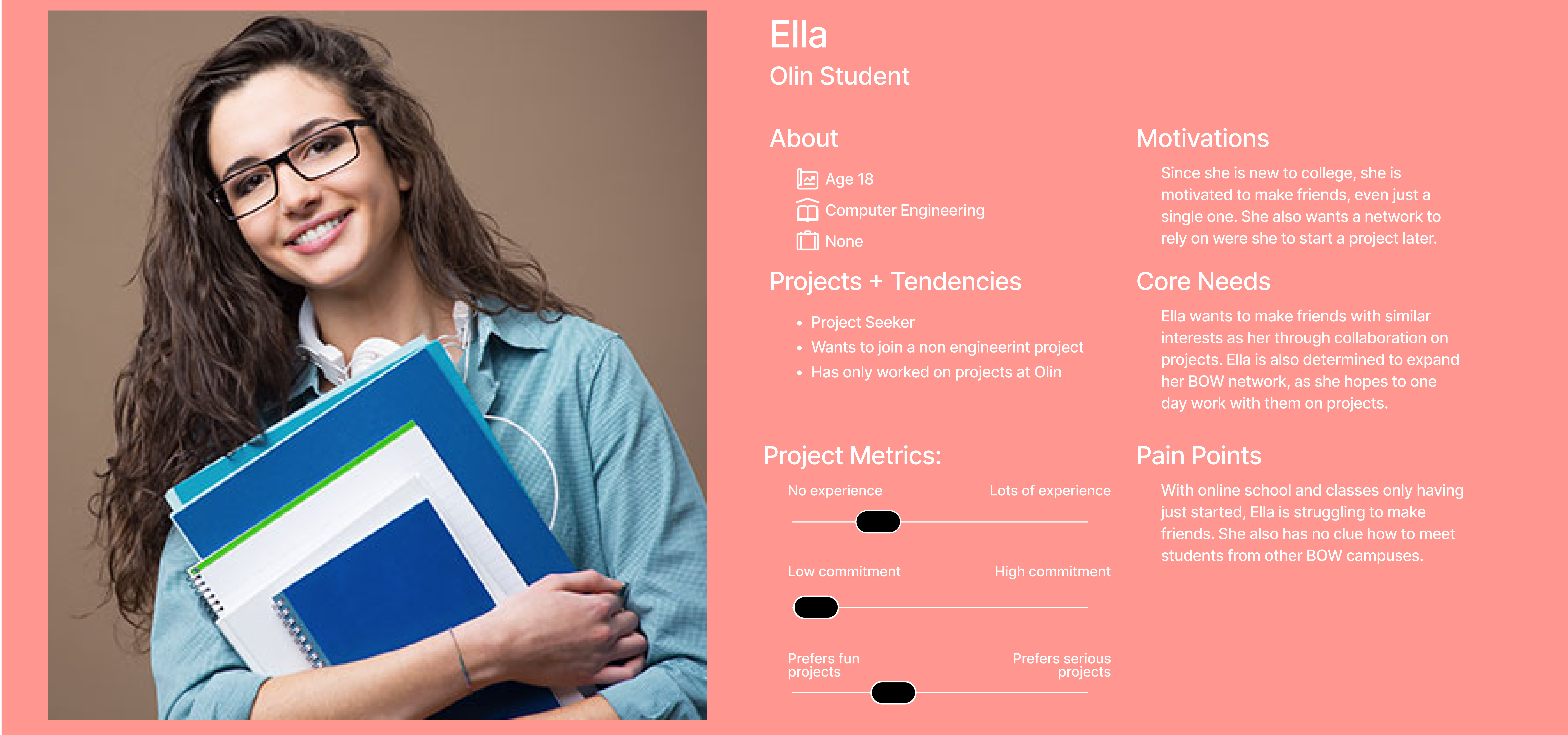Needs Analysis
Conducting user research and engaging with members of the BOW community
Phase Overview
In this phase, our team created a design brief which built onto our Project Brief by including information that was backed by interviews and surveys we sent out. We also created several design artifacts to synthesize our findings and to support our design choices.
Design Brief
Overview
The BOW Project Marketplace is intended to help BOW students who want to connect with each other to foster a stronger sense of community. Right now, there isn't an easy way to learn about activities happening at other schools; the BOW Project Marketplace will provide an easier way for students to join projects and student groups at other colleges.
The Problem
With our team composed of Olin and Babson students, we relate about the lack of a sense of community between all three schools. With the desire to solve this problem, we have these objectives in mind:
After completing these objectives, B Tree S hopes to help the BOW community develop friendships and connections through collaboration on projects.
The User Group
Our target group are undergraduate BOW students who are interested in interacting more with students at other BOW colleges through clubs and working on single semester to multi semester long projects. These BOW students are looking to join a project while they are in college to work on specific skills and explore projects in various areas not limited to engineering or business. We want to design for students who feel restricted or intimidated by the current available methods to collaborate, the activation energy required to look for opportunities, and the ways people communicate across colleges. Our platform will help project leaders provide opportunities for interested students to join their project, whether it is still in the concept phase or if it is an existing team that's looking to recruit new members and skills.
Our Info Collection Plan
During the User Inquiry phase, we sent a survey to BOW students, got 68 responses, and conducted 10 follow-up interviews. For the surveys, we included spectrum questions to collect quantitative data that could be displayed through graphs (see Needs Analysis).
We also included open-ended questions to get a better understanding of our user-group and who would/wouldn’t use the Project Marketplace. For our interviews, we interviewed a strong mix of Olin, Babson, and Wellesley students, including both people working on outside-of-class projects and people who don't. Some initial questions we asked depended on if they worked on an outside project
We also made sure to ask for consent if we could follow up with them for future interviews.
Limitations to Our Info Collection Plan
Needs Analysis
Website Structure
Using common themes from our design inspirations, we created a barebones summary of our website structure. As shown below, we plan to have four tabs/links in our navigation bar: Browse Projects, List a Project, About, and Login or Signup. We have not decided whether the Login or Signup and List a Project elements will look more like buttons or tabs, but we do know that we will need them as to lead the user to other pages.
Interest level response breakdown
In this design artifact, we deconstructed the survey responses to the question, “How interested are you in joining projects that students are working on at other colleges?” We also included the responses that detailed why the survey respondants rated their interest levels the way they did. This helped us get a sense of why our users would or would not be interested in joining project teams across the BOW community.
Personas
Based on our interviewees, we also created 3 different user personas.
Figure 3: Aleesha the Wellesley student
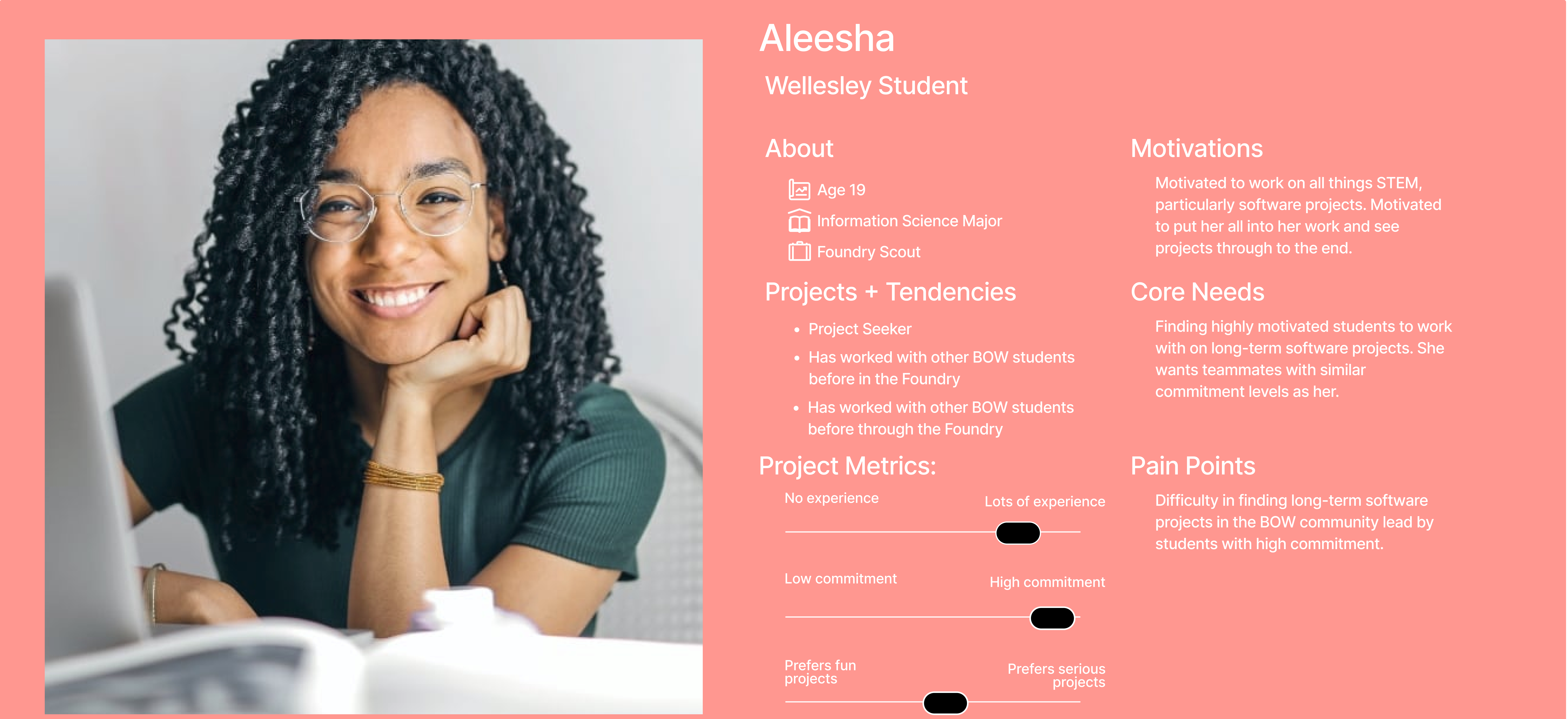
Impact
- BOW students will no longer have to only rely on a decentralized way of communicating such as word-of-mouth to find partners with skill sets they need.
- Olin students who want serious or fun projects won't have to venture out to meet new people and can instead find projects or clubs to join from the comfort of their phone or laptop.
- Wellesley students can join fun projects or clubs before taking the shuttle to Babson or Olin.
- Babson students who are trying to find serious projects with possible cofounders from interdisciplinary backgrounds of BOW will be able to within a close proximity of Babson.
- The BOW Project Marketplace will foster a better sense of community between all schools.
- Olin students will realize there are business opportunities by working on projects with Babson who want serious project partners and Wellesley students who want fun projects in liberal arts.
- Project creators and seekers will not have to rely on paying strangers with skill sets they don't have to help them complete projects, instead building their network in the greater BOW community while also being able to learn and grow with other students on the project.
Solution Requirements
- Our solution will minimize the current barriers to collaboration and communication between the BOW campuses by allowing existing school clubs to enter the platform, and by serving as a tool to help teams form and share their identity with others, similar to how AngelList.com serves the startup community, when recruiting for projects. Additionally, the contact info (phone # and email) of members in clubs and projects will be provided on the app to help BOW students have concrete communication/collaboration tools.
- By the BOW Project Marketplace acting as an angel list for school projects and clubs, students casually looking to join projects (one semester long) or clubs won't be deterred from long-term commitment.
- Multi-device presence with phones, pcs, and macs so the BOW Project Marketplace can reach as many devices as possible.
Limitations and shortcomings
- Lack of interest in the Project Marketplace; Project Marketplace benefits from the networking effect where it offers a better service relative to the growth of the userbase (more users makes it easier to connect with other BOW students, but the service is entirely useless without a high quantity users).
- No business model, the project would have to be funded since the Project Marketplace will not have paywalls or advertisements (too little site traffic to generate any sort of revenue).
Effort Distribution
We all worked on writing up the project brief and brainstorming the survey / interview questions. Claire and Zoe focused on reaching out and conducting follow-up interviews to Olin students who filled out the survey, and James and Julian did interviews for Babson students. Shash helped us connect to 2 Wellesley students at the Foundry.
